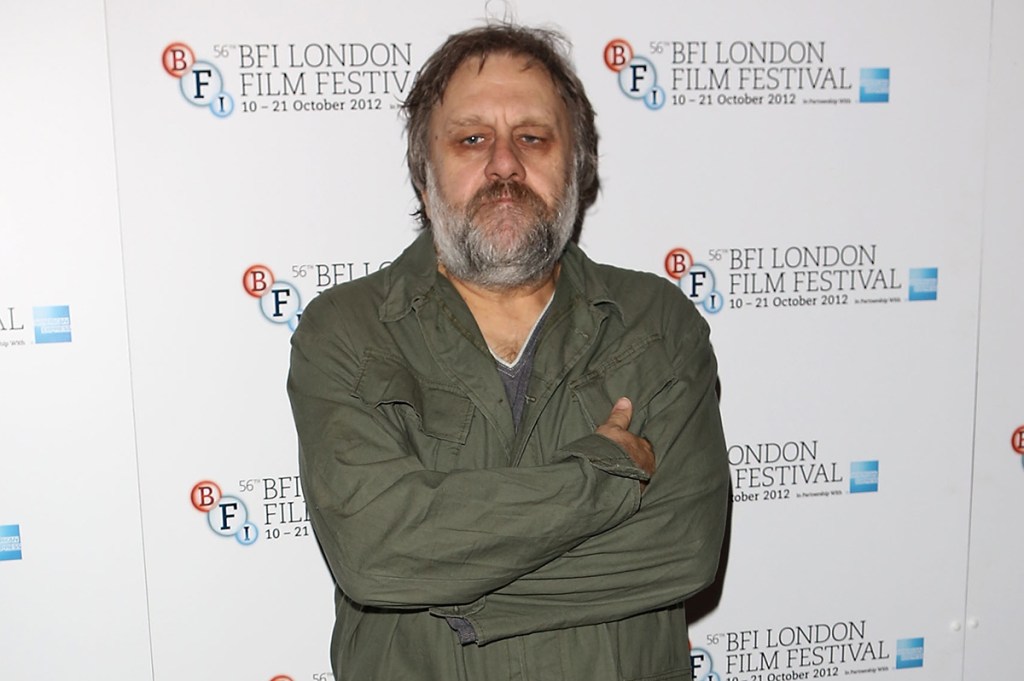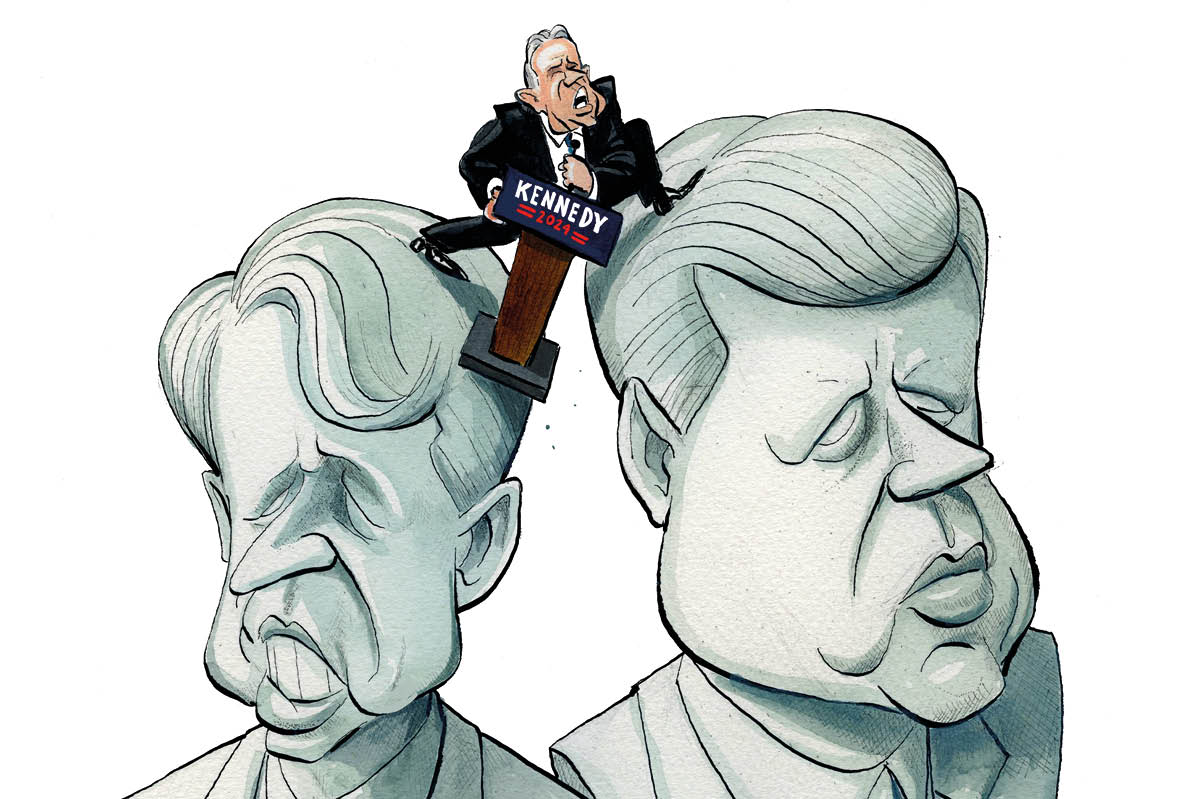‘OK, can do it, but I am ill (NOT the virus).’
With that, the interview is set: an hour on the phone with Slavoj Žižek.
As I thanked Žižek for his time, he stresses, ‘Don’t expect too much. It’s not the virus, but…how do I put this, I have a lot of symptoms of the virus, but hopefully not the virus.’
‘I’ve had these symptoms for years,’ he noted. ‘You know I’m sneezing all the time, and so on.’
We are meant to discuss Žižek’s upcoming book of essays, A Left That Dares to Speak Its Name, which the 70-year-old says is an easier read than the majority of the books he has written in the past five decades.
But Žižek is far more eager to talk about the COVID-19 coronavirus.
‘Europe is approaching a perfect storm,’ he says, before asking whether I’d seen ‘that stupid movie about that fishing boat?’
‘The movie with George Clooney. It was called The Perfect Storm. You know what’s the definition of “perfect storm”? When calamities, like a tornado here and storm there, unite and then their unification multiplies their effect,’ he explained. ‘I think that Europe is now approaching a perfect storm.’
One of those calamities, according to Žižek, is the coronavirus.
‘I don’t get it, even what’s happening here. All official proclamations begin with, “No cause for panic, don’t panic”, and then all that they tell you is reasons to panic,’ he said, before noting that both the health and economic consequences of the coronavirus could cause severe damage to Europe.
‘If you add to this a possible new wave of refugees you get the perfect storm, and I think that Europe is so weakened that it will not be able to react in a unified way, and that’s what I mean when I say coronavirus gives a new chance to communism,’ he said. ‘Of course, I don’t mean the old-style communism. By communism, I mean simply what the World Health Organization is saying. We should mobilize, coordinate, and so on…like, my God, this is a dangerous situation. They’re saying this country lacks masks, respirators, and so on. We should treat this as a war. Some kind of European coordination…maybe even wartime mobilization. It can be done, and it can even boost productivity.
‘What I mean is that it is possible to keep the good sides of capitalism, but nonetheless, through a coordinated state, social effort to mobilize. Not just with coronavirus, this is needed with other ecological crises, refugees and so on.’
What about politics on the other side of the Atlantic? On the 2020 Democratic nomination race, Žižek says, ‘My longstanding analogies are fully confirmed by recent events. Isn’t it absolutely clear that the message of the Democratic party establishment is, “better Trump than Bernie Sanders”?
‘I noticed how on the one hand you have this, let’s call it, “electability problem”. The Democratic establishment is saying Bernie Sanders is too extreme and so on and so on, but my God, that’s how Trump got elected!’ he continued. ‘I mean this line of reasoning that “play safely, stay in the middle if you want to be elected”, no longer works.
‘We have a large socialist movement which gained a serious foothold in United States politics and in the mainstream, and this is incredibly important to be visible there as a serious option.’
Žižek goes on to claim that the Democratic party and Republican party mainstream are becoming ‘indistinguishable’, pointing to billionaire Michael Bloomberg’s brief presidential run as a recent example.
‘If the Democratic establishment were to make a decision at gunpoint as it were — Trump or Sanders — they wouldn’t say, but de facto they would have preferred Trump. So I think, politically, there is the irony.’
According to Žižek, President Trump is too passive. A flaw he cites as being behind the United States’s decision to pull out of Syria, which Žižek described as ‘one of the most catastrophic things that Trump did’.
‘He sacrificed the Kurds,’ Žižek said. ‘The main victims. Everybody wants to screw them. I have full sympathy with the Kurds. Not so much with the Kurds in the north of Iraq, who are more conservative, but the Kurds in the southeast of Turkey and northern Syria.’
‘Trump opened up with unilateral withdrawal, a new situation where basically the two partners there are now Putin and Erdogan, and it’s clear what’s the target of both of them…to ruin Europe. European unity. People even didn’t notice that a similar thing is happening now in Libya. Russia is moving in, supporting one side, Turks supporting the other side in the civil war, and then they are making the deals.
‘I think that this is all coordinated. How this tension threatens Europe with new waves of refugees, which if — now it will sound horrible for a leftist — but I think that the new wave of refugees in Europe means a total ideological, political catastrophe. I am for more refugees…but four years ago when there was the first wave, it should have been done in an organized way. The way — this chaotic way — means that it will not only be Hungary and a couple of other populists. Populists will simply gradually take over Europe, and we should never forget what strange alliances we get here.’
To Žižek, Putin’s Russia and Erdogan’s Turkey are part of a ‘new Axis’ which, due to European passivity, ‘can always blackmail Europe’ through both oil and refugees.
‘I’m just shocked at this passivity of Europe,’ he declares. ‘We pay Turkey €6 billion if they help the refugees. I thought this is a disgusting compromise, but
OK. Then, the time that we had four years of relative peace should have been used for Europe to mobilize not against the refugees, but to change the situation there…of course, Europe should receive more refugees, but this is not the solution.
‘The wealthiest countries there…Saudi Arabia, Kuwait, Emirates. They’re simply not receiving any immigrants. Why Europe? Why not Saudi Arabia, Kuwait, Emirates? Rich, wealthy countries. It should have been easy for them to receive.’
On the ‘populist left,’ Žižek, is skeptical, claiming they prefer to ‘write wonderful books about why things went wrong’ than get their act together.
‘I would like to have a modest, realist left which has positive proposals of what to do. Like, OK, to talk frankly, we cannot obviously step out of capitalism. How to deal with it?’ he said, adding that the populist left needs to work out ‘how to use capitalist mechanisms’.
Žižek, says that ‘the rise of Trump and populism signals the end of this old liberal centrist consensus’.
‘The majority is disappointed by it and we cannot simply return to it. That’s why all around Europe — Le Pen, AfD, and so on — all around we have this populist revolt,’ he declared, before encouraging the left to ‘do what Trump did on the right’.
‘I remember when Trump began, people thought he was too divisive. No! That’s how you win!’ he says. ‘Hillary lost because Hillary tried to play this game. “We must move more to the center”,…the moral majority, the silent moral majority. I think the left should appropriate this. The left’s strategy should not be, “we are radical, we provoke, we use dirty words in public”…I think that the left, to reinvent itself, should present itself in this way. If by postmodernism we mean obscenity, irony, inconsistency, fake news and so on, then Trump is the ultimate postmodern president, and I think that the left should shamelessly begin to scream, “no, we address not just some fringe group, we address normal, modest, impoverished everyday people”.
‘The left should also stop this obsession with it’s this LGBT minority, that minority, and so on and so on. I think that this obsession with different lifestyles, minorities, is ultimately just a maneuver to avoid the big economic problem.’
‘Class struggle is returning,’ Žižek proclaimed, noting that ‘the two surprising mega hits of the last year’, Joker and Parasite, are ‘both movies about class struggle’.
Whether the digital age will help workers in the class struggle, however, is an ‘ambiguous’ question on Žižek’s mind.
‘On the one hand, internet, of course, opens up the new space of immediate social coordination. You can reach millions instantly,’ he explained. ‘On the other hand, here Julian Assange enters I think.’
‘We are gradually becoming aware to what degree the control of internet, who will control the digital space? It’s one of the big battles today…I think this digital space is not simply either good or bad. It’s just one domain of struggle.’
I ask him about Nick Land and the increasingly popular philosophy of accelerationism, which starts from the idea that capitalism and technology should be sped up in order to precipitate social change. He doesn’t seem to know about Land but he says: ‘What I see good in accelerationism is that I don’t buy this idea that you can oppose global capitalism through some kind of local traditional resistance. Some of my Latino American friends claim we should return to ancient tribal traditions and so on and so on. No. I still remain a Marxist here. You have to go through radical capitalist modernization. There is no way back.’

























